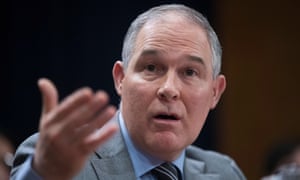A cascade of courtroom standoffs are beginning to slow, and even
reverse, the EPA rollbacks thanks to the administration’s ‘disregard for
the law’
In its first year in office, the Trump administration
introduced a solitary new environmental rule aimed at protecting the
public from pollution. It was aimed not at sooty power plants or
emissions-intensive trucks, but dentists.
Every year, dentists fill Americans’ tooth cavities with an amalgam that includes mercury. About 5 tons of mercury, a dangerous toxin that can taint the brain and the nervous system, are washed away from dental offices down drains each year.
In Trump’s first day in the White House, the administration told the Environmental Protection Agency (EPA) to withdraw an Obama-era plan that would require dentists to prevent this mercury from getting into waterways. But in June, the rule was unexpectedly enacted.
This apparent change of heart followed legal action filed by green groups, part of a cascade of courtroom standoffs that are starting to slow and even reverse the Trump administration’s blitzkrieg of environmental regulations.
“The Trump administration has been sloppy and careless, they’ve shown significant disrespect for rule of law and courts have called them on it,” said Richard Revesz, a professor at the New York University school of law.
“I expect we will see a number of further losses for the administration on similar grounds. If they keep showing the same disregard for the law, their attempt to repeal all these environmental regulations will go badly for them.”
The reversal of Obama’s environmental legacy has been spearheaded by Scott Pruitt, who heads the EPA, the agency he repeatedly sued as Oklahoma attorney general. Pruitt, who accused Obama of “bending the rule of law” and federal overreach, has overseen the methodical delay or scrapping of dozens of rules curbing pollution from power plants, pesticides and vehicles.
Ironically for Pruitt, who has touted a “back to basics” approach rooted safely within the confines of the law, this rapidly executed agenda has run into a thicket of legal problems, causing the administration to admit defeat in several cases.
In July, a federal court ruled that the EPA couldn’t suspend rules designed to curb methane emissions from new oil and gas wells. This was followed by a hasty retreat in August when the EPA agreed to not delay new standards to reduce smog-causing air pollutants, the day after 15 states and environment groups sued.
Then, in December, a federal court told the EPA it couldn’t delay a new standard for dangerous levels of lead in paint and dust.

Every year, dentists fill Americans’ tooth cavities with an amalgam that includes mercury. About 5 tons of mercury, a dangerous toxin that can taint the brain and the nervous system, are washed away from dental offices down drains each year.
In Trump’s first day in the White House, the administration told the Environmental Protection Agency (EPA) to withdraw an Obama-era plan that would require dentists to prevent this mercury from getting into waterways. But in June, the rule was unexpectedly enacted.
This apparent change of heart followed legal action filed by green groups, part of a cascade of courtroom standoffs that are starting to slow and even reverse the Trump administration’s blitzkrieg of environmental regulations.
“The Trump administration has been sloppy and careless, they’ve shown significant disrespect for rule of law and courts have called them on it,” said Richard Revesz, a professor at the New York University school of law.
“I expect we will see a number of further losses for the administration on similar grounds. If they keep showing the same disregard for the law, their attempt to repeal all these environmental regulations will go badly for them.”
The reversal of Obama’s environmental legacy has been spearheaded by Scott Pruitt, who heads the EPA, the agency he repeatedly sued as Oklahoma attorney general. Pruitt, who accused Obama of “bending the rule of law” and federal overreach, has overseen the methodical delay or scrapping of dozens of rules curbing pollution from power plants, pesticides and vehicles.
Ironically for Pruitt, who has touted a “back to basics” approach rooted safely within the confines of the law, this rapidly executed agenda has run into a thicket of legal problems, causing the administration to admit defeat in several cases.
In July, a federal court ruled that the EPA couldn’t suspend rules designed to curb methane emissions from new oil and gas wells. This was followed by a hasty retreat in August when the EPA agreed to not delay new standards to reduce smog-causing air pollutants, the day after 15 states and environment groups sued.
Then, in December, a federal court told the EPA it couldn’t delay a new standard for dangerous levels of lead in paint and dust.

Other arms of the federal government have also been stymied from implementing Trump’s deregulatory agenda. The US Fish and Wildlife Service, stung by a lawsuit, listed the rusty patched bumblebee as endangered in March after initially delaying the decision. And on Thursday, a federal court told the department of energy it must implement four energy efficiency regulations it was looking to scuttle.
Many of these legal problems have stemmed from the sheer pace of the rollbacks – required public comment periods have been set aside in some cases, any rationale for repeal or delay has been missing in others. Opponents of the administration also believe there is a determination to expunge every vestige of Obama’s environmental legacy, regardless of merit.
“They are trying to score political points or attempting to grant favours to corporations who don’t want to follow the rules,” said Aaron Colangelo, the litigation director of the Natural Resources Defense Council. “It all shows that this administration won’t protect the environment unless they are sued. They have been reckless and not followed the basic requirements of the law.”
The EPA now faces a fresh wave of opposition as it looks to craft replacements for major Obama rules such as the clean power plan, which sought to limit emissions from coal-fired power plants, and the waters of the US rule, which greatly expanded clean water protections.
If the proposed replacements are, as expected, far less onerous on industry than current iterations, environmentalists and around a dozen states, headed by New York and California, will be poised to further jam up the process in the courts.
“Over and over again, the Trump administration has put the profits of multinational polluters over the health and well-being of everyday Americans,” said Eric Schneiderman, New York’s attorney general.
Schneiderman has been prolific in opposing Trump’s environmental revisions, filing more than 50 lawsuits during the administration’s first year to, among other things, protect the clean power plan, enforce stricter vehicle pollution standards and ensure that chlorpyrifos, a common pesticide linked to neurological harm to children, is banned.
“We’ve already beaten back several of this administration’s toxic policies, from energy efficiency rollbacks to smog,” Schneiderman said. “Our fight to protect public health and our environment will continue in court.”
- This article was updated on 20 February 2018 to correct the amount of mercury washed away by dental offices each year. It is about 5 tons, not 5m tons as we originally said.

No comments:
Post a Comment